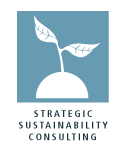The article, entitled "Sustainable Economics", focuses on how companies should communicate their social and environmental activities to the investment community. Here's an excerpt:
Green investing isn’t new — for 20 years some analysts have regarded socially responsible investing as a proxy for good management — but it has recently gone mainstream. Along with consumers and suppliers, investors also need to know a company’s green initiatives.
But investors aren’t necessarily looking for a totally rosy picture, says Jennifer Woofter, president of Strategic Sustainability Consulting, a Maryland-based firm that helps organizations manage their social and environmental impacts. If anything, she says, reports about a company’s eco-footprint that are too sunny are bound to raise suspicions. Instead, she says, investors just want consistent evidence that the company is committed to gauging and addressing its key social and environmental impacts.
“That means the company is probably doing some good things but also recognizing and dealing with bad things,” Woofter says. Admitting a company’s weaknesses is more effective in sustainability reports than “greenwashing.”
Read the whole article here.
We also want to congratulate Deliver on producing an all-green edition. As the magazine notes:
When we at Deliver® decided to devote an entire issue to eco-friendly marketing, we knew we should do more than just write about it. We needed the magazine to reflect the environmentally conscious efforts we were espousing. It wouldn’t seem fitting to emphasize the “green” potential of a direct mail piece such as this while using all virgin paper, or in a magazine printed entirely with energy from fossil fuels. That we needed 100-percent recycled paper was a given — as was the need for environmentally friendly inks, which, in this instance, are mostly a blend of soy and a mixed vegetable oil package. We also worked with our printer to use paper manufactured with wind-generated energy.
What did going "green" mean for this issue? Deliver cites the following impacts:
— 101,000 Pounds of paper used
— 100% Percentage of post-consumer recycled content
— 969 Number of trees preserved
— 411,862 Gallons of wastewater flow saved
— 2,799 Pounds of waterborne waste avoided
— 45,571 Pounds of solid waste prevented
— 89,728 Pounds of greenhouse gases prevented, net
— 686,800,000 BTU s of energy saved
— 46,622 Pounds of air emissions prevented
— 20 Barrels of crude oil saved
Be sure to check out the other articles in this edition--it is chock full of green marketing commentary, suggestions, and analysis. Enjoy!
.gif)